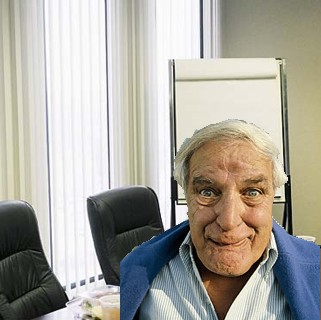Innovations
Not Ready? Not to Worry!
How to be successful at a meeting when you haven’t adequately prepared for it
by Dr. RQ Teasdale
The other day, as I was barreling through a four-way stop at 4:00 AM in my solar powered RV, I started to think about the number of meetings I’ve been to over my long and eventful life. From my first job in 1924 as a Control Supervisor for a WI-FI company to my current position as the Wandering Troubadour of Quality™, I figure I’ve been to well over 20,000 meetings. That isn’t much by UW standards, but it nets out to over three years of non-stop agendas, meeting minutes, and action items. Also, while I don’t freely admit this to many people, I was entirely or somewhat unprepared for at least 95% of these meetings. Yet at each one I was lauded for my contributions and thanked profusely for my efforts. How do I do it? How does a 95 year old man with a degree in TV Viewing from a mail order college seem so on top of it at meetings? That is the secret that I will reveal in this trailblazing article.
There are two steps in the process. The first step is to shorten the time during the meeting where informed discourse could potentially occur. This can be accomplished in a couple of ways.
First, suggest an icebreaker and drag it on as long as possible. This will shorten the actual length of the meeting and reduce the chances that you’ll have to say something intelligent.
Second, never discount the time absorbing value of questions about the weather and the temperature. Virtually everyone can relate to the changes in temperature both inside and outside. If you feel that you may be soon expected to constructively contribute to a meeting, you can either wipe your brow and say “Is it hot in here or is it just me?” or fold your arms across your chest and say “Brrr!”.
Of course there will come a time when talking about the weather and finding about everyone’s summer will no longer be sufficient. This is where the second step comes in: limiting your own exposure to well-prepared participation in the meeting. There are many strategies for dealing with this circumstance; the most popular are outlined below.
Volunteer to be the scribe. This can be beneficial in two ways. First, you do all the writing and don’t have to do much talking, and second, it allows you to look at other people’s thoughts and potentially piggy-back on them.
At any time during a meeting and for as many times as you feel appropriate, say, “We need to be more proactive.” Most of the time, people will look at you and nod approvingly. In the off chance that this doesn’t happen and someone casts a questioning glance towards you, just add “…rather than reactive.”
Every five minutes (bring a watch, this has to be pretty exact), listen really closely to what someone is saying and interject the following: “What I think I hear you saying is…..” and paraphrase what they just said. This will often get approving nods from others and get you off the hook for saying anything for the next five minutes. Continue to repeat the process.
Other useful phrases are:
“We need to take a macro look at this process”
Who-really- are our customers?
“Has anyone tried flowcharting?”
“This may require a more robust solution.”
Special note about the word “robust”. This word is very currently very popular in organizations and makes the person using it sound thoughtful and intelligent. It is virtually impossible to overuse this word in a meeting.
It is always better to ask questions, since you don’t know enough to give any answers. If you’re in a pinch and it seems as if you absolutely have to answer a question, don’t be afraid to answer it with another question.
For example, if someone looks at you and says, “In the last five years how many times have there been exceptions to the payables invoicing process?” say “Could we expand on the Payables invoicing process discussion?” Or if you get in real trouble, rely on the tried and true: “We really need to be more proactive.”
Also, body language helps. No one likes to interact with people who seem frustrated or angry. If you really know absolutely nothing about the subject of the meeting and feel as if you’re overdoing the “we just need to be more proactive” thing, just fold your arms really tight, lean back in your chair and occasionally snort disapprovingly. Other meeting attendees will avoid you like the plague.
And so, with the battery power ebbing on my sun-charged Winnebago and another birthday fast approaching (97 years young!), I’d better get moving. Besides there’s probably another meeting on my calendar that I need to prepare for (or not).
Dr. Teasdale received his doctorate in Television Viewing and Cellular Biology from the College of Universal Life at P.O. Box 3763, Loma Vista, CA.
|


